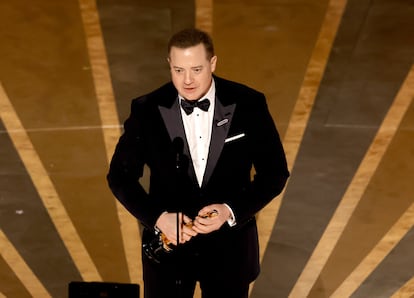‘Everything Everywhere All At Once’ sweeps Oscars with seven wins
The film about the multiverse – produced by the independent studio A24 – picked up the Oscar for Best Picture, Best Director and Best Original Screenplay, among others. Michelle Yeoh and Brendan Fraser won for Best Actress and Best Actor respectively. And a German film – ‘All Quiet on the Western Front’ – took Best International Film and three other statuettes


When Oscar night started, many thought that a single film was going to sweep its 95th edition. However, it turned out that not one, but two movies would dominate the big Hollywood evening from start to finish.
Everything Everywhere All At Once reached the culmination of an incredible journey. After sweeping the alternative film festival South by Southwest, it became a phenomenon among audiences, before ultimately winning seven of its 11 Oscar nominations. This puts it on the same level as classics such as The Bridge on the River Kwai, Lawrence of Arabia, Patton and Slumdog Millionaire.
Among the seven awards won were Best Picture, Best Director and Best Actress. Michelle Yeoh – of Malaysian origin – became the second non-white woman in history to win an Oscar. Meanwhile, All Quiet on the Western Front – a German movie, the third film adaptation of Erich Maria Remarque’s anti-militarist novel – surprised everyone by winning four Academy Awards.
Early in the night, it was clear that Everything Everywhere All At Once was on the way to success. The second and third prizes awarded during the gala went to Ke Huy Quan and Jamie Lee Curtis for Best Supporting Actor and Actress respectively, honoring their work in the science fiction film.
Huy Quan started out as a child actor, achieving fame by appearing in Indiana Jones and the Temple of Doom and The Goonies. However, his career was cut short, due to the difficulty of finding good roles for an Asian actor in Hollywood. His luck changed last night.
Jamie Lee Curtis – the daughter of two Hollywood legends, Janet Leigh and Tony Curtis – is a veteran of Hollywood, with 45 years of experience since she was on the run from a psychopath in the Halloween horror series. At the 2023 Academy Awards, she finally earned her first nomination – and recognition from her peers.
“My mother and my father were both nominated for Oscars in different categories,” Curtis, 64, sobbed. “I just won an Oscar!”
“To all the people who supported the genre of movies I’ve made for all these years – the thousands, hundreds of thousands of people – we just won an Oscar together,” she noted emotionally in her acceptance speech.

This was indeed the comeback night. At the start of the awards ceremony, host Jimmy Kimmel recalled that two actors from Encino Man (1992) – a film trashed by critics for its stupidity, currently bearing a 15% rating on Rotten Tomatoes – were nominated for an Oscar 30 years later: Brendan Fraser and Ke Huy Quan. They both won.
In the 1990s, Fraser was a familiar face in light comedies. However, on Sunday, he erased that past, collecting his first Academy Award for Best Actor for his leading performance in The Whale – a play made into a dramatic film by Darren Aronofsky.
“I started in this business 30 years ago… things didn’t come easily to me, but there was a facility that I didn’t appreciate at the time, until it stopped. And I just want to say thank you for this acknowledgement,” Fraser said. His triumph also underlines the success of A24: the same studio that produced Everything Everywhere All At Once.
“Dreams are something you have to believe in. I almost gave up on mine. To all of you out there, please keep your dreams alive,” said Quan in his acceptance speech. He was born in Saigon, Vietnam, in 1971.
“My journey started on a boat. I spent a year in a refugee camp and somehow I ended up here on Hollywood’s biggest stage,” he said. “They say stories like this only happen in the movies. I can’t believe this is happening to me. This is the American dream.”
The Oscars are no longer what they used to be. And this is without a hint of nostalgia. The ceremony has made clear how the industry has opened up to generational changes.
“This is historic,” said Michelle Yeoh, who became the first Asian to win in the Best Actress category, as well as the second non-white woman to do so since Halle Berry for Monster’s Ball in 2001.
“And ladies, don’t let anyone ever tell you you’re past your prime,” joked Yeoh, 60, who saw her career in Hong Kongese martial arts cinema take off. When she arrived in the United States in 1997 to join a James Bond installment – Tomorrow Never Dies – she found few opportunities. Many consider that an injustice was righted with her triumph last night, as she was never nominated for her amazing performance in Crouching Tiger, Hidden Dragon (2000).

Steven Spielberg spent the night in his seat, watching his most personal film – The Fabelmans – walk away empty-handed. The award for Best Director went to a duo – Daniel Kwan and Daniel Scheinert – two Boston schoolmates who began their careers making music videos.
“Our fellow nominees, you are our heroes. This is very strange,” said Kwan, 35, after beating out the other four nominees. Among them is Spielberg, the father of E.T., who sought to tie Frank Capra and Billy Wilder. Everything Everywhere All At Once took home as many Oscars as Schindler’s List.
The ceremony had a political moment, with the Russian Alexei Navalny triumphing in the documentary category. Canadian Daniel Roher’s film captures the persecution – including poisoning – of Vladimir Putin’s opponent.
“My husband is in prison just for telling the truth, my husband is in prison just for defending democracy. Alexei, I’m dreaming of the day when you will be free and our country will be free. Stay strong, my love,” said Yulia Navalnaya – the politician’s wife – in the acceptance speech. Her husband has been in solitary confinement for 750 days. Roher, meanwhile, used the platform to say that there is no need to fear standing up against dictators and tyrants.
The Film Academy refused – for the second year in a row – to include a message from Ukrainian President Volodymyr Zelenskiy at the ceremony, one year into the war. Zelensky, on the other hand, was able to address the audience at the Golden Globes and at the Berlin Film Festival. However, polls in the United States now show that popular support for Ukrainian troops is beginning to weaken.
Germany won big with its first film adaptation of Remarque’s novel, published in 1929. By the following year, Hollywood had already brought it to the screen. Lewis Milestone’s film – which had the same title, All Quiet on the Western Front – won the third edition of the Oscars with the Best Picture award. Today, as another war is being waged in Europe, the work’s anti-militarist message is, once again, being recognized by the international film community.
Edward Berger’s version – produced by Netflix – is Germany’s first win in the best international film category since 2007, when it was won by Florian Henckel von Donnersmarck’s The Lives of Others. In addition, production design, photography and music were picked up by composer Volker Bertlelmann. His triumph prevented the legendary John Williams, 91, from winning his sixth Oscar.

Tu suscripción se está usando en otro dispositivo
¿Quieres añadir otro usuario a tu suscripción?
Si continúas leyendo en este dispositivo, no se podrá leer en el otro.
FlechaTu suscripción se está usando en otro dispositivo y solo puedes acceder a EL PAÍS desde un dispositivo a la vez.
Si quieres compartir tu cuenta, cambia tu suscripción a la modalidad Premium, así podrás añadir otro usuario. Cada uno accederá con su propia cuenta de email, lo que os permitirá personalizar vuestra experiencia en EL PAÍS.
¿Tienes una suscripción de empresa? Accede aquí para contratar más cuentas.
En el caso de no saber quién está usando tu cuenta, te recomendamos cambiar tu contraseña aquí.
Si decides continuar compartiendo tu cuenta, este mensaje se mostrará en tu dispositivo y en el de la otra persona que está usando tu cuenta de forma indefinida, afectando a tu experiencia de lectura. Puedes consultar aquí los términos y condiciones de la suscripción digital.








































